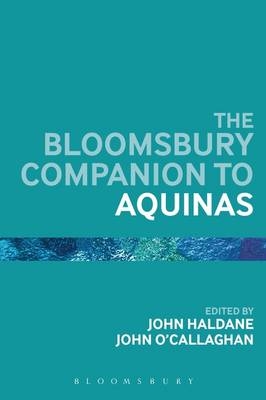
The Bloomsbury Companion to Aquinas
Continuum Publishing Corporation (Verlag)
978-1-4411-4333-4 (ISBN)
- Titel wird leider nicht erscheinen
- Artikel merken
John Haldane is Professor of Philosophy and Director of the Centre for Ethics, Philosophy and Public Affairs, University of St Andrews, UK. John O'Callaghan is Professor of Philosophy and Director of the Jacques Maritain Center at the University of Notre Dame, USA.
Editorial Introduction / Abbreviations / List of Contributors / Part I: Life / The Life and Times of Thomas Aquinas / A Chronology of Aquinas's Life / A Bibliography of Aquinas's Works / Part II: Sources and Contemporaries / Abelard (1079-1142) / Albert the Great (1206-1280) / Alexander of Hales (1170-1245) / Alfarabi (880-950) / Anselm (1033-1109) / Aristotle (384-322 BCE) / Augustine (354-430) / Averroes / Ibn Rushd (1126-1198) / Avicebron (1020-1070) / Avicenna / Ibn Sina (980-1037) / Roger Bacon (1210-1292) / Boethius (480-525) / Bonaventure (1221-1274) / Giles of Rome (1247-1316) / Robert Grossteste (1175-1253) / John of Salisbury (1115-1180) / Peter Lombard (1100-1160) / Pseudo-Dionysius (5th-6th C) / Moses Maimonides (1135-1204) / Richard of St Victor (1100-1173) / Siger of Brabant (1235-1284) / William of Moerbeke (1215-1286) / Part III: Early Critics / William of Baglione (????) / Durand of Saint Pourcain (1270-1334) / John Peckham (1225-1292) / Etienne Tempier (d. 1279) / Robert Kilwardby (d. 1279) / Gerald of Abbeville (d. 1272) / William de la Mere (d. 1290) / Uberto Guidi (d. 1280?) / Part IV: Commentators / Domingo Banez (1528-1604) / Thomas Cajetan (1469-1534) / John Capreolus (1380-1444) / Peter Crockaert (1465-1514) / Sylvester Ferrara (1474-1528) / Pedro da Fonseca (1528-1599) / Antoine Goudin (1639-1695) / John of St Thomas (1589-1644) / Francisco Suarez (1548-1617) / Francisco de Toledo (1522-1596) / Francisco de Vitoria (1485-1546) / Part V: Concepts, Themes and Topics / Abortion / Abstraction / Accidents / Act and Potency / Action / Agnosticism / Analogy / Angels / Aristotelianism / Ascension / Atonement / Baptism / Beatitudo/Happiness / Being / Bible / Causality / Certainty / Chance / Change / Church / Commentary / Conscience / Creation / Damnation / Death / Dispositions / Disputations / Distinction / Divine Nature / Dualism / Embryology / Emotion / Entelechy / Error / Essence / Eternity / Evil / Existence / Faculties / Faith and Reason / Five Ways / Form and Matter / Freedom / Future / God / Good / Government / Habit / Hope / Ideas / Identity / and Individuation / Imagination / Immortality / Imperatives / Incarnation / Infinity / Intention / Intellect, Active and Passive / Intuition / Knowledge / Language / Logic / Love / Mathematics / Meaning / Miracles / Morality / Motion / Mysticism / Nature / Natural Law / Naturalism / Negative Way / Nominalism / Obligation / Ontological Argument / Participation / Perfection / Power / Prayer / Predestination / Principles / Propositions / Providence / Prudence / Realism / Reason, Practical / Reason, Speculative / Resurrection / Revelation / Scholasticism / Science / Self / Sense-perception / Sex / Simplicity / Sin / Soul / Species / Substance / Theology / Thomism / Time / Transcendentals / Transubstantitaion / Trinity / Truth / Universals / Virtues / Will / Part VI: Synopses of Key Writings / Commentaries on Aristotle / De Aeternitate Mundi (On the Eternity of the World) / De Ente et Essentia (On Being and Essence) / De Malo (On Evil) / De Potentia (On Power) / De Principiis Naturae (On the Principles of Nature) / De Regimine Principium (On Government) / De Unitate Intellectus (On the Unity of the Intellect) / De Veritate (On Truth) / Scriptum super Libros Sententiarum (On the Sentences of Peter Lombard) / Summa Contra Gentiles (Summary of Christian Teaching) / Summa Theologiae (Summary of Theology) / Part VII: Influence / First Thomism (13th to 15th centuries) / Second Thomism (16th to 18th centuries) / Neo-Thomism (19th century) / Transcendental Thomism (20th century) / Existential Thomism (20th and 21st centuries) / Analytical Thomism (20th and 21st centuries) / Index of Aquinas's Works / Index of Names / Index of Topics.
| Erscheint lt. Verlag | 31.8.2017 |
|---|---|
| Reihe/Serie | Bloomsbury Companions |
| Verlagsort | New York |
| Sprache | englisch |
| Maße | 156 x 234 mm |
| Themenwelt | Schulbuch / Wörterbuch ► Lexikon / Chroniken |
| Geisteswissenschaften ► Philosophie ► Philosophie des Mittelalters | |
| Religion / Theologie ► Christentum ► Kirchengeschichte | |
| ISBN-10 | 1-4411-4333-5 / 1441143335 |
| ISBN-13 | 978-1-4411-4333-4 / 9781441143334 |
| Zustand | Neuware |
| Haben Sie eine Frage zum Produkt? |
aus dem Bereich


